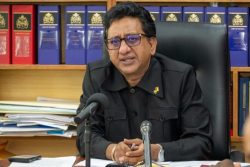As the popularity of international athletics soared in the late 1970s with the increase of television coverage, athletes no longer had to surreptitiously receive under the counter payments or ‘gifts’ for their appearances at meetings, as changes in the amateur rules legitimately allowed the reward of appearance fees and bonuses for setting records. With the increase in sponsorship and endorsements payments came the inevitable temptations to bend the rules and increase earnings.
Soon, the ugly mask of doping cast its lustful shadow over the sport. Like a wandering albatross extending its wings in flight, doping has scarred virtually every international sport today; nothing seems to have escaped its dark world. At times, the sports fan wonders if what he is reading in the media isn’t an excerpt from the latest John Le Carré novel.
Doping had been very prevalent in the Tour de France since the 1960s, and first five-time winner (1957, 61-64), Jacques Anquetil never hid the fact that he took drugs, and would even tell reporters what he had taken if asked. In fact, the cyclists went on strike during the 1966 tour at Bordeaux when drug testing was introduced.
The drug culture has evolved into a massive industry today. The Ben Johnson scandal of the 1988 Seoul Olympics seems a far cry from the Russian bombshell that fell in 2015 when it was revealed that the state had been involved in assisting over 1,000 athletes between 2011 and 2015 with carefully orchestrated doping, which led to the international community screaming for Russia to be banned from the 2016 Rio Olympic Games, following the World Anti-Doping Agency’s recommendation.
The trigger that led to the investigation of the massive Russian operation had been pulled by an American Bryan Fogel, who had set out to make a documentary film on the impact of self-administered performance-enhancing drugs. Whilst researching for the project, Fogel was introduced to Dr Grigory Rodchenkov, the former head of Russia’s anti-doping programme, who provided details on the depths and complexity of his country’s doping systems.
Fogel’s account first appeared in the New York Times and detailed an elaborate scheme that began the year before the 2012 London Olympic Games and continued through the 2014 Winter Olympics in Sochi, Russia until August 2015. Canadian lawyer Richard McLaren’s independent report for the WADA) confirmed Fogel’s report and Russia’s desperation to win at all costs while hosting the winter games.
Rodchenkov, who had tried to commit suicide following a power struggle was in a psychiatric unit, when he was invited in 2011 to London for a pre-Games tour and briefing of the laboratory at Kings College where the testing of the Olympians would take place. Rodchenkov, one of the 115 scientists who worked in the lab during the Games, was easily able to defeat the tests with the knowledge of the lab’s capabilities which had been presented to him. In Sochi, an elaborate scheme of switching urine samples and bottle-tampering, gave Russian athletes the huge advantage of actually taking drugs during the games, leading to thirteen gold medals according to Rodchenkov.
Today, Fogel who presented his evidence to the New York Times, the FBI, the American Department of Justice, WADA and the IOC, is very frustrated at the IOC’s complicity, “after presenting them [WADA and IOC] with the end of Olympic history.” The IOC failed to ban Russia completely from the 2016 Olympics, instead it passed the buck on to the individual sports federations, as it explained that the McLaren report never had the authority to bring anti-doping cases against individual athletes, despite the conclusive evidence of the report of widespread cheating.
The IOC has opted to re-analyse all 254 urine samples collected from Russian athletes from Sochi, since all 63 re-tested blood samples collected from Russian athletes were all negative. In September, an internal report circulated among WADA executives, stated that 95 of 96 athletes named in the McLaren report had been cleared of WADA’s evidence and the IOC’s findings. It is important to note that WADA or the IOC never interviewed Rodchenkov, citing his unavailability, a charge Rodchenkov’s lawyer denied in a letter to WADA.
“It is important to keep in focus that McLaren’s mandate was finding out about the system. He gave us names but he and we said from one day there probably wouldn’t be enough evidence for an individual anti-doping violation,” Olivier Niggli, WADA director general was quoted in a Reuters News interview, last week.
WADA, 50% funded by the IOC, can only observe and report their findings, but with no mandate to enforce them, the organization is virtually powerless. Niggli said that WADA had a new set of compliance standards and the sanctions process would be carried out by an independent body, probably the Court of Arbitration for Sport, and no longer by national bodies or federations.
Craig Reedie, the head of WADA, also is a member of the IOC. Which begs the question how can he promote the Olympic ideal whilst simultaneously pursuing transgressions that can tarnish its repetitions?
In 2010, Vitaly Stepanov, an employee at the Russian Anti-Doping Agency, RUSADA, began sending emails and letters to WADA officials of systematic doping by Russian athletes. The officials opted to turn the correspondence over to the Russian sports authorities, instead of starting their own investigations. British journalist Nick Harris claims to have informed the IOC in July, 2013 of Rodchenkov’s lab. In December, 2014 the German public broadcaster ARD aired a documentary called, ‘The Doping Secret: How Russia creates its champions,’ which claimed that the system was based on the former “East Germany-style.”
Fogel’s film, ‘Icarus’, was released in August and details how the whistleblower Rodchenkov, fled Russia two years ago, leaving his family behind, arriving in the USA with a computer hard drive crammed with evidence of the Russian cheating scheme at the Sochi Olympics. Today, fearing for his life, he lives in the witness protection programme, after two other senior former Russian anti-doping officials, Nikita Kamayev and Vyacheslav Sinev died suddenly within weeks of each other, in February, 2016. David Walsh, sportswriter for The Sunday Times of the UK, claims that Kamayev, who died of a massive heart attack had written to him in November, 2015 informing him that he was planning to write a book about the last three decades he had spent working in a secret doping lab in Russia.
The International Association of Athletic Federa-tions (IAAF) had banned Russia in November, 2015 and a recent ballot to reinstate it, voted 166 to 21 (disappointingly, including Jamaica) in favour of maintaining their ban from the sport. A two-thirds majority will be required for their reinstatement to the sport. After issuing several denials, in August of this year, Russia issued an apology to the IAAF for the first time. Russia is expected to participate in the Winter Olympics in Pyongyang and will host the FIFA World Cup in the coming year.
Within the last two weeks, the Russians issued a warrant for Rodchenkov’s arrest. “We don’t know why Rodchenkov fears for his life, but we know he is on the international wanted list for crimes that he purportedly committed in Moscow,” Kremlin spokes-man, Dmitry Peskov informed Reuters.
The next time we change the channel to look at a sports programme, we should be asking ourselves, are we the ones being duped?









